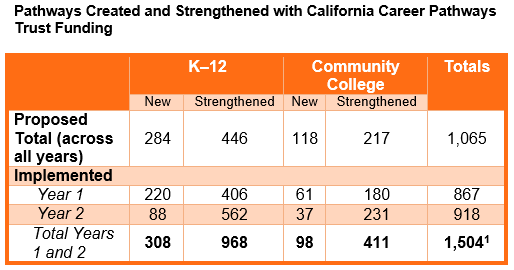Note: This is part of Advance CTE’s blog series, “Getting to Know…” We are using this series to help our readers learn more about specific states, State CTE Directors, partners and more.
State Name: California
State CTE Director: Donna Wyatt, Director, Career and College Transition Division, California Department of Education
About California: California is a state that doesn’t just give lip service to career readiness; it fully commits to preparing learners for meaningful careers. Last summer, the Career and College Transition Division underwent a significant reorganization that elevated the role of career readiness within the Department of Education. The state legislature has also appropriated more than $1.4 billion in the past few years to support Career Technical Education (CTE) and career pathways across the state through various initiatives and grants.
In California, CTE is delivered through comprehensive high schools, career academies, community colleges and 74 Regional Occupational Centers and Programs (ROCPs). California recognizes 15 industry sectors loosely organized around the National Career ClustersⓇ framework, including state-specific sectors such as fashion and interior design. While programs are developed and administered locally, there are seven technical assistance centers across the state that support local districts to evaluate and improve their program offerings. These efforts are guided by a framework of 11 elements of a high-quality CTE system that are outlined in the state’s Carl D. Perkins Career and Technical Education Act of 2006 (Perkins) state plan.
Notable in California – College and Career Indicator: In 2016, the California Department of Education unveiled a new school dashboard with various measures of school performance to provide transparency for students, families and communities. The dashboard is designed to satisfy school accountability requirements under the Every Student Succeeds Act (ESSA). Included in the dashboard is a College and Career Indicator to rate schools on their success in preparing learners for post-high school transitions. Currently, schools are evaluated on only three levels — prepared, approaching prepared and not prepared — that include measures such as CTE pathway completion and dual enrollment.
While the dashboard was implemented with only three levels for this indicator, efforts are underway to define what it takes for students to be “well prepared” for college and careers. State leaders in California are working to define this level and are exploring options such as work-based learning participation and industry-recognized credential attainment.
Notable in California – California Career Pathways Trust: The California Career Pathways Trust (CCPT) is a multi-million dollar grant program authorized in the 2013-14 state budget to accelerate the development of regional 9-14 career pathways. Between 2014 and 2015, grants of up to $15 million were awarded to 87 sites, which include partnerships between high schools, colleges and businesses.

According to a 2017 evaluation of CCPT, more than 800 discrete school-level pathways were developed or strengthened in the first year of the initiative, including in both community colleges and high schools. Many of these included CTE course sequences, work-based learning and student support services. Further, many sites reported that the partnerships established through their CCPT work led to lasting relationships and collaboration with key industry leaders.
While selected sites are continuing to receive funding through CCPT, the program was designed as a one-time investment to accelerate regional career pathways work. Day-to-day CTE programs and career readiness activities are supported through the CTE Incentive Grant program and the Local Control Funding Formula.
Austin Estes, Senior Policy Associate
